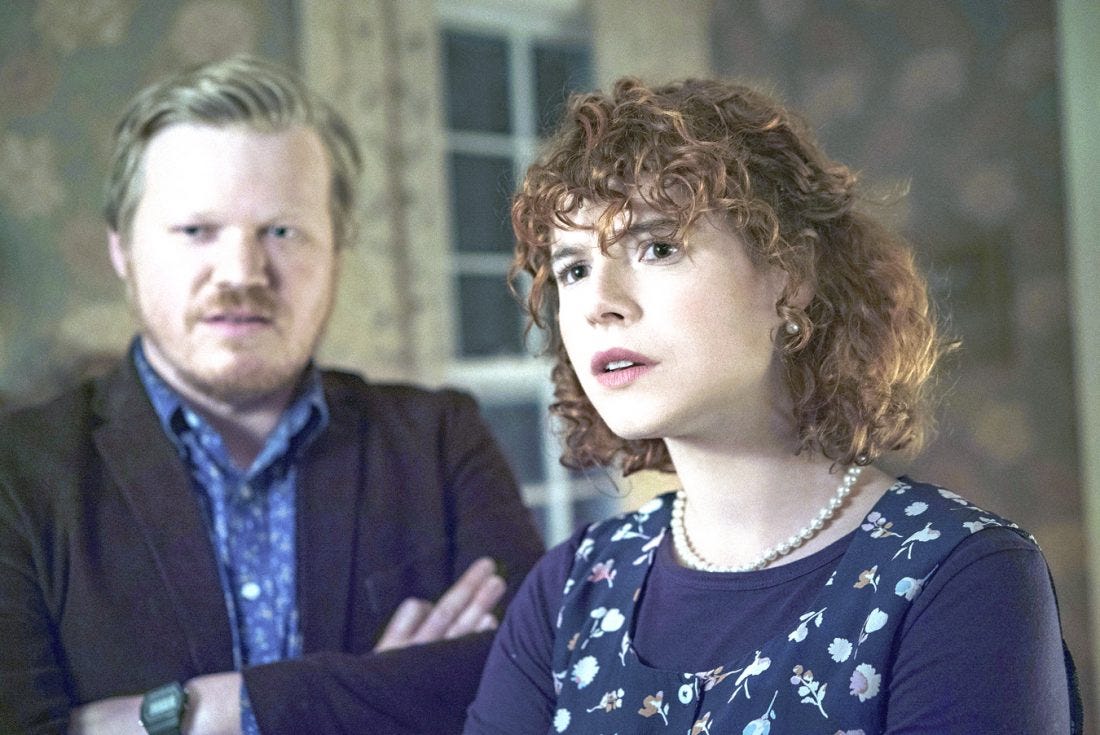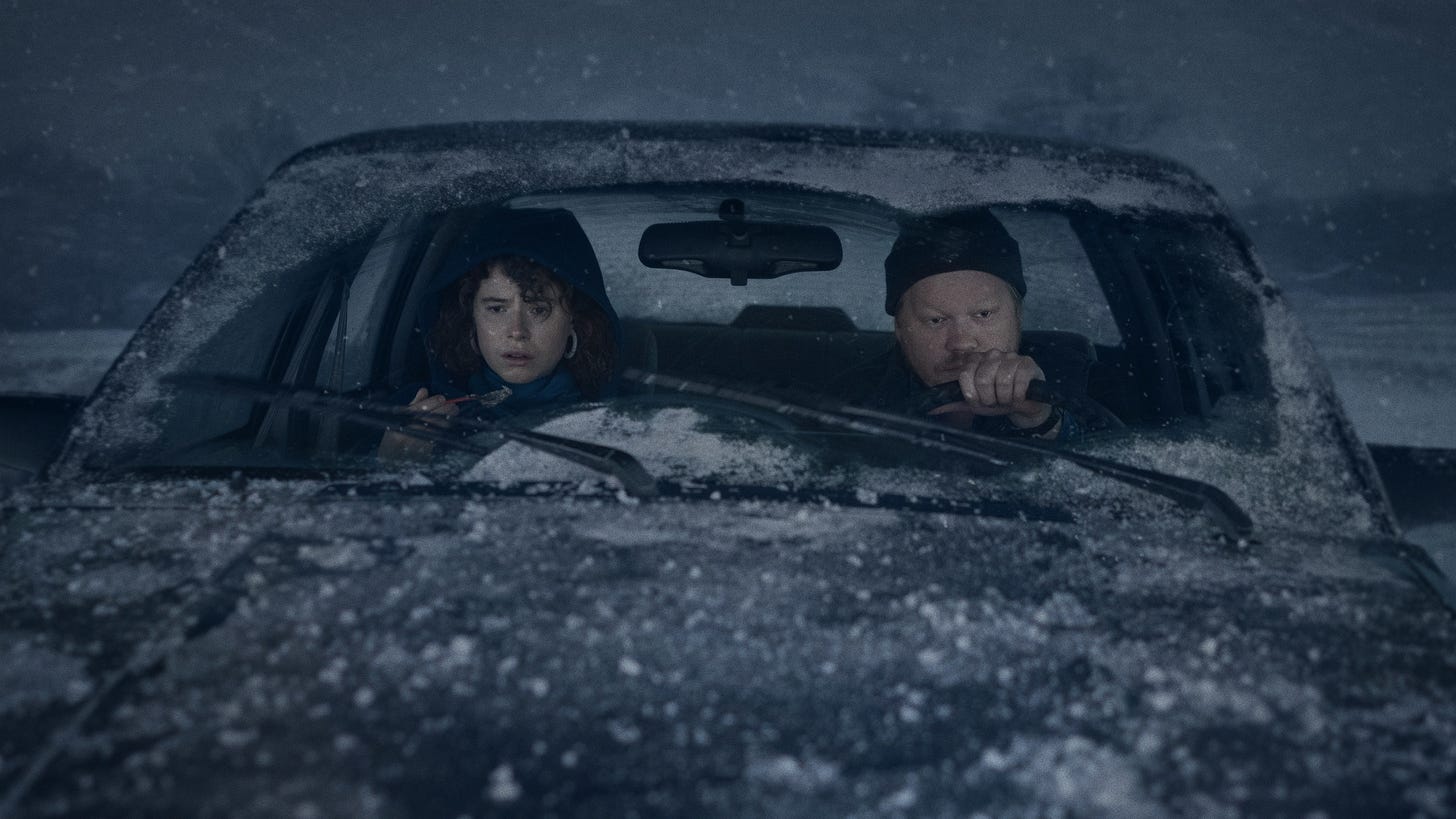It’s interesting to think of where Hollywood was when I was down. You had major film figures like Charlie Kaufman trying to get a job, any job, just to remain relevant, in an industry with less studios that made less movies. Kaufman’s version of “selling out” (aside from being one of the many uncredited writers on the totally-generic sci-fi pandemic flop “Chaos Walking”) was to adapt a novel for streaming. I still recall the press he did for this film, the modest indifference he showed towards his finished work that suggested this was a movie he just tossed off.
Well, I’m a Kaufman fan. And filmmakers should be put on alert that the hypnotic, spooky “I’m Thinking Of Ending Things” is Kaufman, the most distinct storyteller in film, on autopilot. This is adapted from a book by Iain Reid. When the book was released, it was heralded as a horror novel, but that’s a slippery designation for a book that tells a hallucinatory story of a woman’s headspace as she goes on a road trip with her casual boyfriend near what she sees as the close of the relationship.
Slippery is the keyword for the movie as well. The book feels completely insular, told from the perspective of a young woman who begins wondering where she is, what she is, how she is, trapped in a snowy cabin with the eccentric parents of a man for whom she cares little. The idea of the book is ambiguous, the reader staying with the protagonist as she goes off on tangents about who she was before she met this man, and why she suddenly feels so alien, to them and to herself. What kind of person does a relationship make someone? How much do they change?
But the movie is not entirely inside her head. So instead of beginning in a position of narrative fluidity, the story has to start from a concrete point. That concrete point is inside a four-door skittering down a snowy road in the middle of a brutal snowstorm. The girl, Jesse Buckley, and the boy, Jesse Plemons, clumsily spar over a number of trivial issues, neither showing any actual chemistry with each other (a dynamic which seems like even more work for an actor than having two people who get along). Instead of the foundations of the unnamed protagonist’s mind crumbling, Kaufman establishes the pillars of the entire world slowly melting into a miasma of mispronunciations and malapropisms.
Once they arrive at his parents’ house, the movie starts to resemble Kaufman’s “Synecdoche, New York”. That effort, Kaufman’s directorial debut and one of the great cinematic accomplishments of the 21st century, frequently made an abstract point about how we keep track of the passage of time in our own handpicked ways, and yet we don’t notice it in others. As the two meet the crusty parents played by Toni Collette and a thoroughly repulsive David Thewlis, the girl is constantly surprised as the two patriarchs begin to age considerably, coming to pieces with just one quick trip to the bathroom.
The film’s third act spirals out from their decision to leave, and/or the decision of the universe to expel the two from that snowy cabin literally located in the middle of nowhere. There is an encounter with a janitor, which in the book is something of a digression but in the film is integrated in the most peculiar way possible, the film freely casting off the requirements of reality, and/or a sturdy narrative. This is not a simple book, but this is a considerably labyrinthe movie, one that ends with a conclusion I am still puzzled by. I confess, I may have to revisit this one soon, but it was a journey swaddled in mysteries and riddles I continue to decipher today.
I had the book sent to me around 2019. I was fortunate enough to have people send books. When I finished them, I would donate them to the prison library. In my experience, the prison libraries were powered entirely by donations from inmates. That meant the libraries were almost entirely comprised of crap you’d never read if you actually liked books, just a lot of fast-paced Tom Clancy junk and scads of superhero comic books. When books were donated, they had to be approved by the staff, and you got the sense maybe some books were either rejected, misplaced or just repurposed. But whenever something good popped up in the library catalog, I knew I could always gain access to it, because guys were just addicted to the latest James Patterson piece of junk.
If you would like to donate books to a prison, they will likely not be accepted. But there are organizations like Books Behind Bars, Prison Book Program and Books To Prisoners that accept donations. When you are in prison, they encourage you to reach out to these organizations to request books, and they ask you to be specific. But because of the volume of requests, they often take at least six months to get back to you. And the selection isn’t great, which is why they need donations from People Like You. At one point, I put in a generic request for a sports book, and I got a small hardcover about how to teach womens’ basketball. I hope you’ll find a way to reach out to these people.






